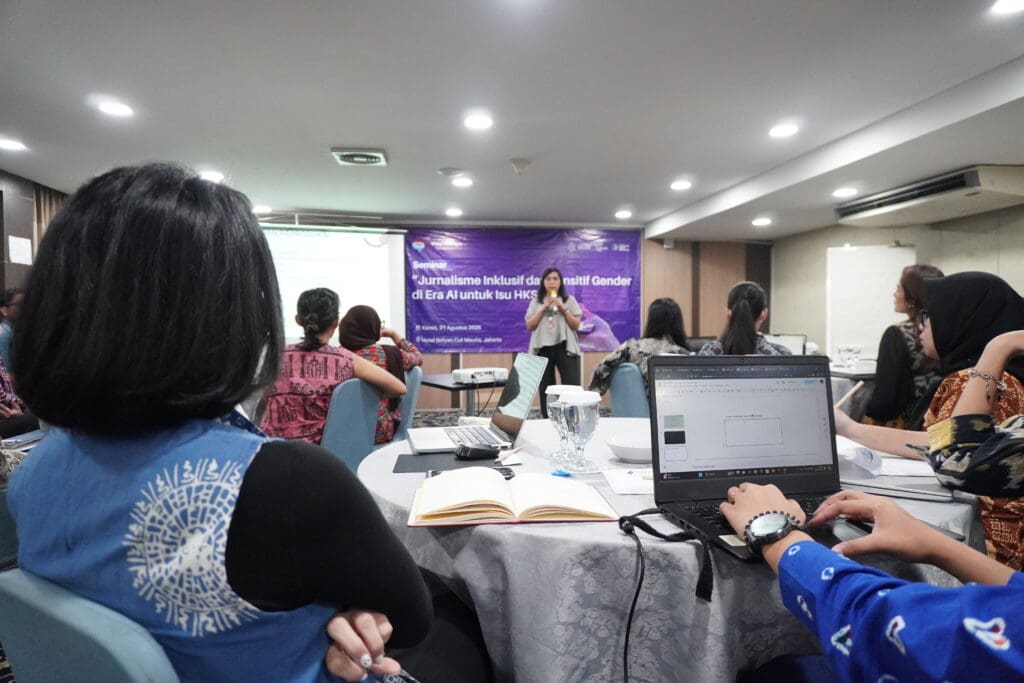As artificial intelligence (AI) continues to reshape the media landscape, journalism is confronted with the critical challenge of upholding the principles of humanity, inclusivity, and gender justice. In response, RNW Media, in collaboration with Campaign for Good and Yayasan Gemilang Sehat Indonesia, convened a seminar titled “Inclusive and Gender-Sensitive Journalism in the AI Era for SRHR Issues” on Thursday, August 21, at Hotel Menteng, Central Jakarta.
Supported by RHRN2 and Masarouna program, the seminar forms part of the global campaign #MediaFreedomInAIEra, an international initiative dedicated to advancing press freedom and fostering journalism that is ethical, inclusive, and gender-responsive in the face of accelerating digital transformation. The seminar gathered women journalists, journalism students, activists, and media practitioners concerned with Sexual and Reproductive Health and Rights (SRHR) issues. Through panel discussions, case studies, and hands-on workshops, participants were guided to identify gender bias in news reporting, reshape narratives towards more balanced perspectives, and harness AI as a tool for data verification while ensuring the human touch in storytelling remains intact.

Three keynote speakers brought diverse perspectives to the discussion. Purnama Ayu Rizky, Managing Editor of Magdalene, highlighted that the media often perpetuates bias in selecting sources and framing stories. She stated that journalistic ethics must stand as a safeguard against AI-driven algorithms that risk reinforcing gender stereotypes. Indira Susatio, Communication & Campaign Manager of Yayasan Gemilang Sehat Indonesia, lead organization for RHRN2 program in Indonesia, underscored the importance of gender-sensitive communication when addressing SRHR issues. She pointed out that media narratives directly shape public understanding of sexual and reproductive health rights, making cross-sector collaboration between civil society, journalists, and media organizations essential.
From the field perspective, Aisha Shaidra, senior journalist at Tempo Magazine, shared real-world challenges in reporting sensitive gender and SRHR issues. She emphasized the critical role of empathy in interviews, source selection, and narrative construction to prevent re-victimization of vulnerable groups, while also acknowledging AI’s potential in supporting fact-checking without undermining the humanity of journalism.
Beyond keynote talks, participants engaged in interactive workshops, including content writing practice and critical reviews of biased news stories. They were trained to craft gender-just narratives and apply AI tools responsibly and ethically to amplify SRHR issues. The initiative also connects with the Campaign for Good app, enabling the wider public to engage in digital advocacy, support press freedom, and learn about inclusive journalism practices.
William Gondokusumo, CEO of Campaign for Good, emphasized the importance of building a fair and inclusive digital space:
“Technology should serve as a bridge, not a barrier. Through #MediaFreedomInAIEra, we aim to create a collaborative platform where journalists, activists, and communities can unite in advancing narratives that are inclusive, transparent, and impactful.”
Echoing this, Wouter van Tongeren, CEO of RNW Media, reaffirmed RNW’s commitment to ethical use of AI in journalism:
“Media freedom is the foundation of democracy. In the era of AI, we face both immense opportunities and profound challenges. RNW Media is committed to ensuring that technology amplifies marginalized voices instead of silencing them. With this global campaign, we hope to empower journalists to confidently use AI in ethical ways while keeping human values at the forefront.”
Through this seminar an integral part of the #MediaFreedomInAIEra campaign the organizers aspire for journalists, activists, and public communicators in Indonesia to become more critical, sensitive, and empowered in addressing SRHR issues, recognizing AI not as a threat, but as a partner in strengthening ethical, inclusive, and impactful journalism.
